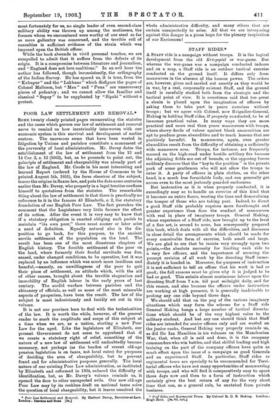POOR LAW SETTLEMENT AND REMOVAL.*
SOME twenty closely printed pages enumerating the statutes and the cases which govern our law of settlement and removal serve to remind us how inextricably interwoven with our economic system is this survival and development of earlier custom. The enormous sums that have been wasted in litigation by Unions and parishes constitute a monument of the perversity of local administration. Mr. Davey dates the establishment of the law of settlement from the 13 and 14 Car. 2, c. 12 (1662), but, as he proceeds to point out, the principle of settlement and chargeability was already part of the law of England. Mr. Coode in his most interesting and learned Report (ordered by the House of Commons to be printed August 5th, 1851), the locus classicus of the subject, traces the origins in Saxon law, and puts the date some centuries earlier than Mr. Davey, who properly in a legal treatise confines himself to quotations from the statutes. The remarkable thing about the law of settlement is that there is practically no reference to it in the famous 43 Elizabeth, c. 2, the statutory foundation of our English Poor Law. The fact provokes the comment that the Legislature very little foresaw the effect of its action. After the event it is very easy to know that if a statutory obligation is enacted obliging each parish to maintain "its own poor," there must sooner or later arise a need of definition. Equally natural also is the dis- position to go back, for this purpose, to the ancient servile settlement of the population on the land. The result has been one of the most disastrous chapters of English history. The forcible settlement of the poor on the land, where formerly their feudal servitude was due, ceased, under changed conditions, to be operative, but it was replaced by an influence which was much more insidious and baneful,—namely, an unwillingness of the poor to quit their place of settlement, an attitude which, with the aid of other causes, brought about the terrible stagnation and immobility of English labour in the early years of last century. The sordid warfare between parishes and the chicanery of officials, as well as some of the most miserable aspects of pauperism, have been the result. The law of the subject is most industriously and lucidly set out in this volume.
It is not our province here to deal with the technicalities of the law. It is worth the while, however, of the general reader to mark the amplitude and scope of this subject at a time when we are, as a nation, starting a new Poor Law for the aged. Like the legislators of Elizabeth, our present Government do not seem to apprehend that if we create a statutory right of relief, something of the nature of a new law of settlement will undoubtedly become necessary, not perhaps (as the burden of recent old-age pension legislation is on taxes, not local rates) for purposes of deciding the area of chargeability, but to prevent fraud and for administrative purposes generally. The local nature of our existing Poor Law administration, as instituted by Elizabeth and reformed in 1834, reduced the difficulty of identification, but, as Mr. Davey's volume reminds us, it opened the door to other unexpected evils. Our new old-age Poor Law may by its reckless draft on national taxes solve the question of local chargeability, but it leaves unsolved the
* Poor Law Settlement and Removal. By Herbert Davey, Barrister-at-Law. London : Stevens and Sons. [9s.]
whole administrative difficulty, and many others that are certain unexpectedly to arise. All that we are interposing against this danger is a pious hope for the plenary inspiration of our Excisemen!










































 Previous page
Previous page